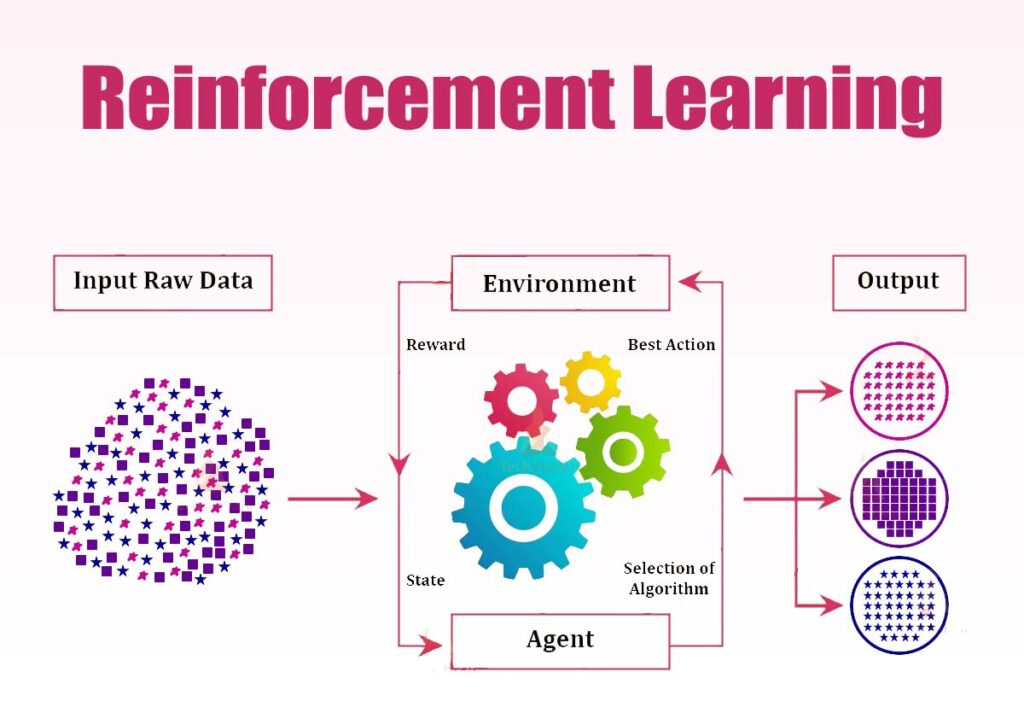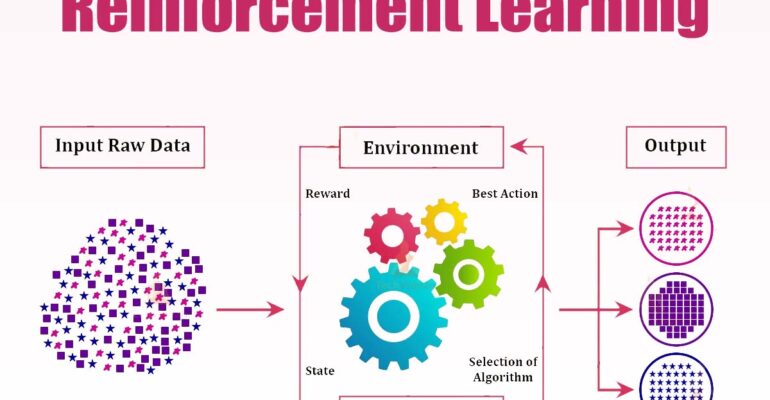Reinforcement Learning: A Deep Dive into the Future of Artificial Intelligence
Reinforcement Learning: A Deep Dive into the Future of Artificial Intelligence
In the realm of artificial intelligence (AI), one area that has garnered significant attention and acclaim is Reinforcement Learning (RL). This paradigm, inspired by behavioral psychology, empowers machines to learn and make decisions by interacting with their environment. As we embark on this journey into the world of Reinforcement Learning, we will unravel its intricacies, explore its applications, and contemplate its profound impact on shaping the future of AI.
Understanding the Essence of Reinforcement Learning
The Fundamental Concept
At its core, Reinforcement Learning is a type of machine learning where an agent learns to make decisions by taking actions in an environment. The agent is guided by a system of rewards and punishments, shaping its behavior over time. The ultimate goal is for the agent to discover the optimal strategy that maximizes cumulative rewards.
Components of Reinforcement Learning
- Agent:
- The entity responsible for making decisions and taking actions within the environment.
- Environment:
- The external system with which the agent interacts. It responds to the actions of the agent and provides feedback in the form of rewards.
- State:
- The current situation or configuration of the environment that the agent perceives.
- Action:
- The decisions or moves made by the agent in response to the observed state.
- Reward:
- The numerical feedback received by the agent after taking an action. It guides the agent in learning which actions are favorable.
- Policy:
- The strategy or set of rules that the agent follows to determine its actions based on the observed state.

The Learning Process
Reinforcement Learning involves a continuous loop of interaction between the agent and the environment:
- The agent observes the current state of the environment.
- It selects an action based on its policy.
- The environment responds with a reward and transitions to a new state.
- The agent updates its policy based on the received reward and state transition.
This iterative process allows the agent to adapt and improve its decision-making abilities over time.
Applications of Reinforcement Learning
Gaming and Entertainment
One of the earliest breakthroughs in Reinforcement Learning came in the realm of gaming. Games, with their well-defined rules and reward structures, provide an ideal environment for training RL algorithms. AlphaGo, developed by DeepMind, stunned the world by defeating human champions in the complex game of Go, showcasing the prowess of RL in mastering strategic decision-making.
Robotics
In the domain of robotics, Reinforcement Learning plays a pivotal role in enabling robots to learn and refine their actions through interactions with the physical world. Robots equipped with RL algorithms can adapt to unforeseen challenges and learn to perform complex tasks with a level of dexterity that was once deemed elusive.
Autonomous Vehicles
The automotive industry has embraced Reinforcement Learning to enhance the capabilities of autonomous vehicles. RL algorithms enable vehicles to learn optimal navigation strategies, respond to dynamic traffic conditions, and make decisions in real-time, contributing to safer and more efficient transportation systems.
Finance and Trading
In the financial sector, Reinforcement Learning is employed for algorithmic trading and portfolio optimization. RL models can learn to make investment decisions by analyzing market trends, optimizing trading strategies, and maximizing returns while managing risks.
Healthcare
Reinforcement Learning has found applications in personalized medicine, drug discovery, and treatment optimization. RL models can learn from patient data to recommend personalized treatment plans, contributing to more effective and tailored healthcare solutions.
Natural Language Processing
Advancements in natural language processing have been accelerated by the integration of Reinforcement Learning. Chatbots and virtual assistants can learn to understand and generate human-like language, providing more intuitive and interactive user experiences.
Challenges and Future Directions
Exploration vs. Exploitation
One fundamental challenge in Reinforcement Learning is the balance between exploration and exploitation. The agent must explore different actions to discover optimal strategies while exploiting known actions to maximize immediate rewards. Striking the right balance is a complex and ongoing research endeavor.
Sample Efficiency
RL algorithms often require a large number of interactions with the environment to learn effective policies. Improving sample efficiency, or the ability to learn from fewer experiences, is a critical area of focus for researchers working to make RL more practical in real-world scenarios.
Generalization
Achieving generalization, where an RL model can apply knowledge learned in one context to different but similar situations, is a key challenge. Generalizing across diverse environments is essential for the broader adoption of RL in complex, dynamic settings.
Ethical Considerations
As RL systems become more sophisticated, ethical considerations come to the forefront. Issues related to bias, fairness, and the unintended consequences of learned behaviors demand careful attention. Responsible development and deployment of RL systems are paramount to prevent negative societal impacts.
Transfer Learning
The ability to transfer knowledge gained in one task to accelerate learning in another task is a promising avenue. Transfer learning in RL aims to leverage previously acquired skills to expedite the learning process in new and related domains.
Real-world Robustness
Ensuring the robustness of RL algorithms in unpredictable and dynamic real-world environments is a critical challenge. Adapting to unforeseen circumstances, handling noisy or incomplete data, and maintaining reliable performance are ongoing areas of research.
Emerging Trends and Innovations
Meta-Learning
Meta-learning, or learning to learn, is an exciting area within Reinforcement Learning. Meta-learning algorithms aim to enable agents to quickly adapt to new tasks with minimal training data by leveraging knowledge acquired from previous tasks.
Deep Reinforcement Learning
The integration of deep neural networks with Reinforcement Learning, known as Deep Reinforcement Learning (DRL), has revolutionized the field. DRL enables the training of more complex and expressive models, allowing agents to learn hierarchical representations and make decisions in high-dimensional spaces.
Explainable Reinforcement Learning
As RL models become more intricate, there is a growing emphasis on making their decision-making processes interpretable and explainable. Explainable Reinforcement Learning aims to provide insights into why an agent makes specific decisions, fostering trust and transparency.
Human-in-the-Loop Reinforcement Learning
Incorporating human feedback into the RL learning process is gaining traction. Human-in-the-loop Reinforcement Learning seeks to combine the strengths of automated learning with human intuition and expertise, leading to more robust and adaptable AI systems.
Quantum Reinforcement Learning
The marriage of quantum computing with Reinforcement Learning has the potential to usher in a new era of computational power. Quantum Reinforcement Learning explores the use of quantum algorithms to enhance the efficiency and scalability of RL models.
The Future Landscape of Reinforcement Learning
As Reinforcement Learning continues to advance, its impact on various industries and facets of daily life is poised to be transformative. From personalized healthcare to intelligent robotics and beyond, the applications of RL are vast and continually expanding.
Ethical Guidelines and Responsible AI
As we witness the proliferation of AI technologies, it is imperative to establish robust ethical guidelines and frameworks. Developers, researchers, and policymakers must collaborate to ensure that RL systems are designed and deployed with ethical considerations in mind, safeguarding against biases and unintended consequences.
Democratization of Reinforcement Learning
The democratization of Reinforcement Learning is an ongoing trend, with efforts aimed at making RL accessible to a broader audience. Open-source platforms, educational initiatives, and user-friendly tools contribute to empowering developers and organizations to harness the potential of RL in their applications.
Interdisciplinary Collaboration
The future of Reinforcement Learning lies in interdisciplinary collaboration. Researchers, engineers, and experts from diverse domains must come together to address complex challenges and unlock the full potential of RL across industries.
Continuous Learning and Adaptability
The dynamic nature of the world demands AI systems that can continuously learn and adapt. Reinforcement Learning models that can thrive in ever-changing environments, learn from real-world experiences, and exhibit a high degree of adaptability will be at the forefront of technological innovation.
Closing Thoughts
Reinforcement Learning stands as a beacon of innovation in the landscape of artificial intelligence. Its ability to enable machines to learn from interaction, make decisions in complex environments, and adapt to novel challenges positions RL as a driving force in shaping the future of AI.
As we navigate the intricate realms of RL, it is crucial to approach its development and deployment with a sense of responsibility, transparency, and a commitment to ethical practices. The journey into Reinforcement Learning is not merely a technological endeavor; it is a profound exploration of how machines can augment human capabilities and contribute to a more intelligent, adaptive, and equitable future.

